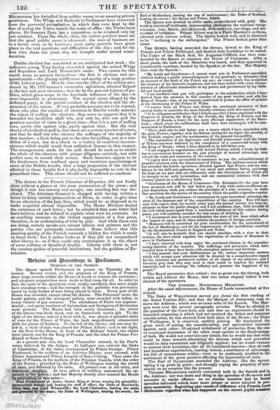Dublin election has concluded as we anticipated last week ;
the unknown young Tory having succeeded against the united Whigs and Repealers and Lord MORPETH'S name. Two causes for this result seem to present themselves : the first is obvious and un- questionable—the glaring indifference and apathy of a large portion of the Liberal party. How far that was the effect of the tedium pro- duced by Mr. O'CONNELL'S successive agitations, whereof Repeal is the last and most tiresome—how far by the general dulness of po- litics, which gives scope to the dominant influence of the day—it were impossible to pronounce. The second cause alleged by the defeated party, is the partial conduct of the election and the ob- struction of the voters. If very probable accounts are to be trusted, those who plan the conduct of elections in Dublin totally mistake the object of polling the electors: they seem to suppose that it is intended the candidate shall win, and only he, who can poll the greatest number of votes in a given time—that it is a sort of polling race, partly side against side, partly against time. But the true theory of an election-poll is, that there are a certain number of voters, and that he shall win who obtains the suffrages of the majority of that number; a limit being put to the time for polling, not as a con- dition of a race, but as a check to a variety of vexatious inconve- niences which would result from unlimited licence in that respect. The arrangements made for the poll should be such as to enable the whole of the electors, with proper diligence certainly, but with perfect ease, to record their names. Such, however, appear to be the hindrances from confined space and vexatious questionings at some of the Dublin booths, that a large proportion of the electors allotted to those booths find it physically impossible to vote in the prescribed time. This abuse should not be suffered to continue.


























 Previous page
Previous page